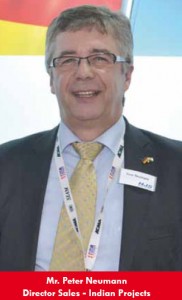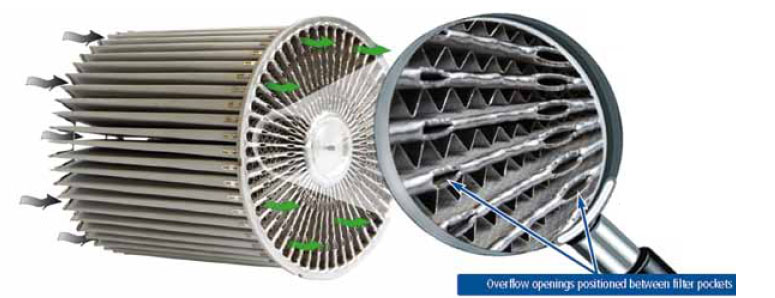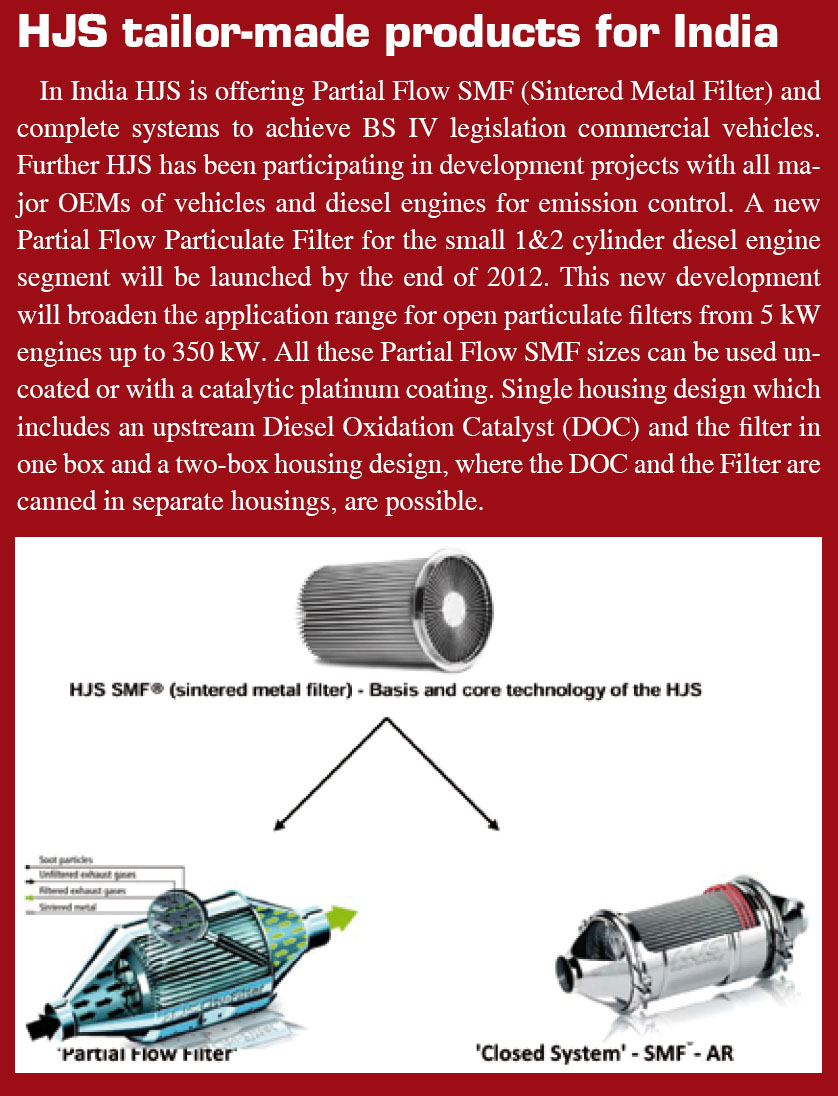An exclusive interview by MOTORINDIA
 HJS Emission Technology, a German manufacturer and innovator of emission control equipment, operational in India since 2008, has recently moved its offices from Bangalore to Gurgaon (New Delhi) where its subsidiary HJS Emission Technology India Pvt. Ltd. uses the location also for purchasing activities for its European business.
HJS Emission Technology, a German manufacturer and innovator of emission control equipment, operational in India since 2008, has recently moved its offices from Bangalore to Gurgaon (New Delhi) where its subsidiary HJS Emission Technology India Pvt. Ltd. uses the location also for purchasing activities for its European business.
HJS Emission Technology India benefits from its German parent company with over 35 years of experience as an EGT systems supplier. Over 500 employees are engaged in developing and manufacturing original and retrofit equipment for passenger cars and commercial vehicles as well as for a wide range of non-road mobile machinery and stationary applications.
In an exclusive interview to MOTORINDIA, Mr. Peter Neumann, Director Sales – Indian Projects, explains in detail the company’s ambitious plans.
Excerpts:
MOTORINDIA (MI): HJS became functional in India in 2008, while HJS Emission Technology India Pvt. Ltd. was established in March 2011. Please give us an update on your Indian operations thus far.
Peter Neumann (PN): It is true that HJS started the process of exploring the Indian market at the close of 2008, which was then followed by a step-wise setting up of its Indian subsidiary in Bangalore. Today, just two years down the line, we are happy to announce that we have set up our own warehouse in Gurgaon, with its close proximity to Delhi, and also some of our customers and associates.
 HJS is delivering a series products to two OEMs already and has projects running with many other customers. The pace of business is no doubt a calculated and moderate one, since the nationwide move from BSIII to BSIV legislation is still underway. But, nevertheless, HJS is increasing its customer base in the “On-road” and “Non-road” segments, the latter being for the export market in Europe and the US. It has already signed contracts for starting local production in India.
HJS is delivering a series products to two OEMs already and has projects running with many other customers. The pace of business is no doubt a calculated and moderate one, since the nationwide move from BSIII to BSIV legislation is still underway. But, nevertheless, HJS is increasing its customer base in the “On-road” and “Non-road” segments, the latter being for the export market in Europe and the US. It has already signed contracts for starting local production in India.
MI: With expertise in exhaust after-treatment systems for over three decades and having studied the Indian market for few years, what is your strategy for the market?
PN: We learned a lot over the years to make it easier and more cost effective, thanks to our prior experience in Europe where we have been successful with our products during the shift from Euro III to Euro IV.
HJS is following a long-term strategy to bring products to India which were already developed in Germany, but will adjust these products to the Indian market in technology and cost, without compromising on quality. Therefore, localization is one major step together with the common development of customer need. Depending on market increase for BS IV and BSV products, the company will also establish the required resources in India to provide the most effective service to customers.
MI: Considering the host of new models developed by manufacturers, specifically for the Indian market, are you looking at India-specific products and solutions?
PN: Yes, India-specific products and solutions are our important concern. We are working on the development of new products for the Indian market, especially in market segments which do not exist in Europe. A good example is the 3&4-wheeler segment which is very important in India but with no presence in Europe in significant numbers. For this segment, we are developing particulate filters. Another aspect is the very cost sensitive market. Therefore adjustments to the products are required to make them competitive.
MI: How are your expansion plans unfolding? Could you give us an update on your venture to set up a manufacturing base in Delhi (NCR)?
PN: Expansion depends on business growth. With the increase in numbers for BS IV vehicles in India, our expansion plans will automatically follow. As mentioned earlier, everything is prepared to start production in India, and discussions are on, to be ready for higher quantities.
MI: Has HJS achieved breakeven in its Indian operations? And what, according to you, have been the high-points in your Indian run till date?
PN: As mentioned above HJS has a long-term strategy. When we are talking about quantities in BS III and BS IV market, more than 95 per cent of the commercial vehicles will be sold in BS III. The business with BS IV vehicle is yet to start in interesting quantities, and clear boundary conditions in legislation is still on its way, as to when BS IV will get into force, nationwide.
 A large percentage of our products are designed to meet BS IV legislation. But the future potential of this segment looks very encouraging and, therefore, many of our development and application projects are in progress. But in spite of all challenges, HJS has now sold over the last 1½ years approximately 3,000 particulate filters and filter systems which include a Diesel Oxidation Catalyst. And our footprint in India is positively essential!
A large percentage of our products are designed to meet BS IV legislation. But the future potential of this segment looks very encouraging and, therefore, many of our development and application projects are in progress. But in spite of all challenges, HJS has now sold over the last 1½ years approximately 3,000 particulate filters and filter systems which include a Diesel Oxidation Catalyst. And our footprint in India is positively essential!
MI: A few words on your presence in the aftermarket segment. How have your products fared against competition?
PN: As mentioned above, the product is made to achieve BS IV legislation limits. The market just started using these products and aftermarket is not in focus today. It is also clear that our products will be sold through OEMs to the aftermarket because of the present contract situation and since many of the products are customized.
MI: Many German companies have established their R&D centre in India to focus on Indian operations. What are your plans on these lines? Please throw some light on your R&D infrastructure and also on patented products or solutions, if any.
PN: Depending on business increase and customer requirements we establish resources for development and application locally. At the moment the product development is based in Menden, Germany, and testing will be done at the customer site. This split is working very well, and we do not see any need to install a local R&D and support immediately. With increasing business this will change for sure. HJS is prepared to support its customers locally, in future.